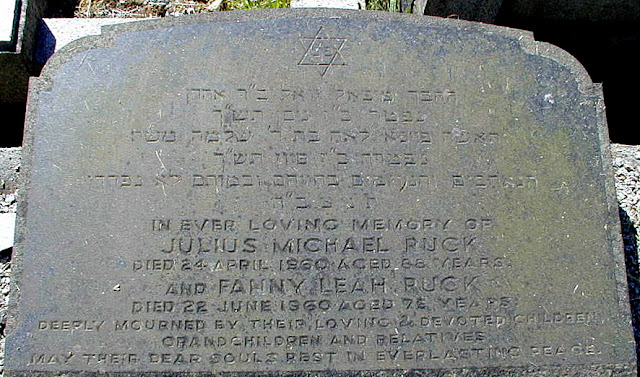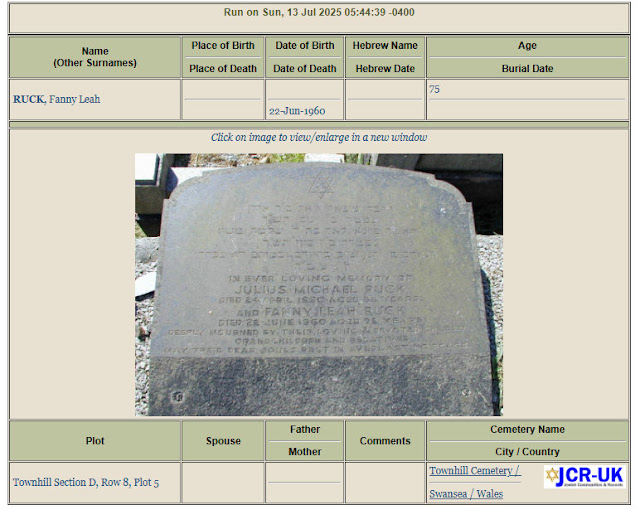Fanny Leah Levinson is the sister-in-law of Minnie Glynn, my 1st cousin 2x removed. Levinson family HERE. Glynn family HERE
Born: 12 July 1886 in Svislach or Svisloch (Belarusian: Свiслач, romanized: Svislač, Russian: Свислочь; Polish: Świsłocz; Yiddish: סיסלעוויטש), a town nowadays in the Grodno Region, Belarus.
Depending on the document her date of birth is given as from 1884 to 1886 - 1886 in the 1911 census and 1939 register, 1884 on her marriage certificate, 1921 census and tombstone
Hebrew name: Feyga Leah daughter of Moshe Chaim. It is incorrectly listed on her tombstone as Shlomo Moshe
Siblings
- Rachel (Ray) Levinson (1896 - 1961) married Harris Endbinder (1886 - 1975) in (July - September) 1918 in Liverpool, England
- Maxwell Levinson (1895 - 1922) married Minnie Glynn (1898 - 1980) in Liverpool, England on 16 March 1922
- Cecilia Levinson (1898 - 1957) married Harris Lewis in (January - March) 1923 in Liverpool, England
Migration: Fanny came with her family to England sometime between 1903 and 1908, age 17 to 22
Married: Julius Michael Ruck on 24 February 1909 in the Great synagogue in Russell Street, Liverpool, England. Fanny was 24 and Julius age 34
Children
Their first child was born in 1909 when Julius was 35 and Fanny 23. Their last child was born in 1917 when Julius was 42 and Fanny 31
- Eunice Ruck 1909 - 1984
- Nancy Freda Ruck 1912 - 1995
- Harold Cecil Ruck 1917 - 1974
Census details
1911
In 1911 Julius and Fanny are married and living at 2 Station Boulevard, Aberdeen Road, Swansea, Wales. The dwelling has 5 rooms. Julius is age 37 and an importer of fancy goods on his own account. Fanny is age 25. Their daughter is Eunice age 1 and they have a Jewish domestic servant, Hetty Struel age 16, who was born in Russia
1921
Fanny is visiting her parents and her siblings who are living in a 5 room terrace at 7 Montpelier Terrace, Upper Parliament Street, Liverpool. Her father Moses is age 62 and six months and a picture framer on his own account working out of a premises on 33 Park Place, Liverpool. Her mother Hannah Rachel is listed as Rachel and is 57 and three months. Her sister Cecilia is 23 and five months and a school teacher. Her brother Max is 25 years and eleven months and an assistant manager. Fanny is named Fanny Ruck age 36 years and eleven months. She normally lives with her family at 55 Walter Road in Swansea Wales
1921 census for Fanny and her parents in Liverpool, England
1921 census for the Ruck family in Swansea, Wales. The family are in a 9 room dwelling at 55 Walter Road. Julius is 48 years and 6 months, a wholesale importer of toys and fancy goods and the children are Eunice age 11 years and 6 months, Freda age 8 and Harold age 3 years and 8 months
1939 Register
Photos

Fanny and Julius visiting Egypt in 1934
An undated photo of Fanny and Julius
Electoral Register
Fanny and Julius listed on the electoral register in 1950. Their address is 55 Walter Road, Swansea, Wales
Death
Burial record for Fanny Ruck
.jpg)
22 June 1960 in Swansea, Wales at age 73. She is buried in the Townhill Cemetery, Swansea, Wales, section D, Row 8, Plot 5
.jpg)
Tombstone for Fanny and Julius Ruck: "In ever loving memory of Julius Michael Ruck died 24 April 1960 aged 88 years and Fanny Leah Ruck aged 76 years. Deeply mourned by their loving and devoted children, grandchildren and relatives. May their dear souls rest in everlasting peace"
Hebrew translation: "Here are buried
The companion Michel Yoel son of Mr. Aharon
Passed away 27 Nisan 5720
The woman Feyga Leah daughter of Mr. Shlomo Moshe
Passed away 27 Sivan 5720
Loving and pleasant in their lives, and in their deaths undivided
May their souls be bound up in the bond of life"
The companion Michel Yoel son of Mr. Aharon
Passed away 27 Nisan 5720
The woman Feyga Leah daughter of Mr. Shlomo Moshe
Passed away 27 Sivan 5720
Loving and pleasant in their lives, and in their deaths undivided
May their souls be bound up in the bond of life"
Probate
RUCK Fanny of 55 Walter Road Swansea widow died 22 June 1960 at Sancta Maria Nursing Home Ffynone Swansea Administration Carmarthen 12 January to Freda Stephens married woman and Eunice Sharpes widow. Effects £2,464 12s. 10d.
Place of Birth
SVISLOCH (Pol. Swisłocz ), town in Grodno district, Belarus; within Poland before 1795 and between the two world wars. A number of Jews settled there at the beginning of the 18th century on the invitation of the owners of the locality, the princes of Tyszkiewicz. In 1752 the Council of Lithuania imposed a poll tax of 215 zlotys on the Svisloch community, which numbered 220 in 1766. Until the middle of the 19th century the Jews of Svisloch earned their livelihood mainly from trade in timber and grain, shopkeeping, and crafts; they later also engaged in innkeeping and the lease of public houses. After a great fire, in which most of the Jewish shops were destroyed, the fairs were no longer held in Svisloch and the Jews were deprived of their principal sources of livelihood. Around 1870 Jews began to pioneer in the tanning industry and improved methods of manufacture with the assistance of German experts whom they invited. By the end of the 19th century a number of tanneries had been established in Svisloch, which employed hundreds of workers. Many Jews from the surrounding areas went there in search of employment. As early as the middle of the 19th century Jewish craftsmen in Svisloch attempted to organize themselves into guilds. At the beginning of the 20th century the Bund Movement developed in Svisloch and it embraced the whole of the Jewish working populace (tanners, tailors, shoemakers, carpenters. smiths, and bakers), who organized strikes for the amelioration of working conditions in tanneries and factories. In 1905 the workers' organization was established for Jewish self-defense against pogroms.
Residences
In the 1921 census Fanny is staying with her family at 7 Montpelier Terrace, Upper Parliament Street, Liverpool, England L8. This Regency terrace, dating from the 1820’s, stood between Grove Street and Bloom Street and was demolished in the late 1960’s. This is a view of part of Montpelier Terrace taken in 1968. It is now the site of the Woman's Hospital


.jpg)
.jpg)





.jpg)

.jpg)



